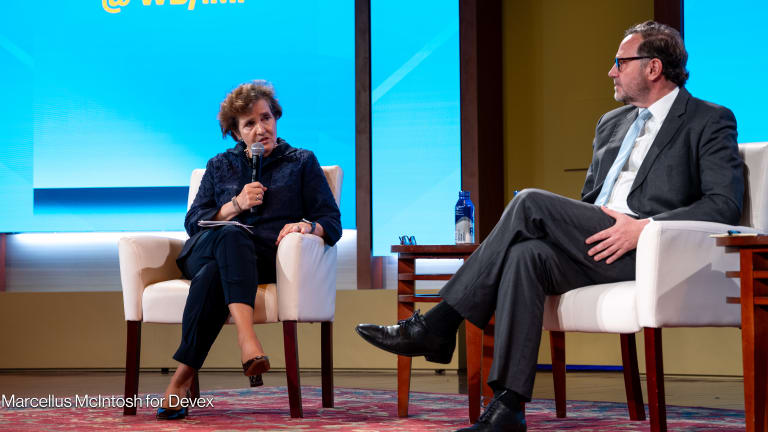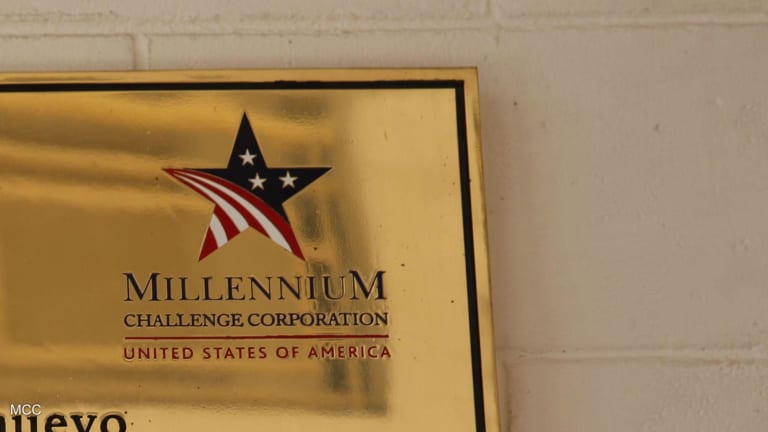The next evolution of the MCC compact
The Millennium Challenge Corp. enjoys broad bipartisan support and a reputation for transparent, evidence-driven implementation — but is the agency's single-country model holding it back? That model might be changing soon.
After 10 years of country compacts, the Millennium Challenge Corp. is going regional, assuming the U.S. Congress signs off on the idea. MCC’s development investment model works, according to the U.S. agency’s supporters, but it may be time to take the once-experimental idea beyond the single-country level. When the former President George W. Bush administration created MCC just over 10 years ago, it was supposed to gather all the lessons learned from a half-century of development implementation and distill them into a new “country-owned” and incentive-based partnership model for delivering foreign assistance. The agency enjoys broad support, but that support hasn’t translated into the significant budget increases some expected would follow the successful demonstration of the MCC model. The agency’s budget has remained relatively flat, at around $1 billion a year. MCC is looking for new ways to evolve and to expand its impact. After 10 years spent partnering with individual countries that meet the agency’s rigorous “scorecards” on issues like control of corruption, girls’ education and access to credit, MCC’s leaders are considering whether adherence to national borders is restricting the agency’s impact. Increasingly, issues like access to power, trade, and transportation transcend individual countries’ abilities to plan and implement development projects. “In 10 years, the world around you changes, and if you want to continue to be a successful, effective agency, then you have to think about how you evolve as well,” Alicia Phillips Mandaville, MCC’s chief strategy officer, told Devex in an exclusive interview. In that spirit — and with some urging from aid watchers and lawmakers — MCC has begun to think about new forms of partnership that would allow the agency to tackle transborder issues with regional, multicountry investments. “How do we think about literally taking what we do to the next level,” Mandaville said. “We work well nationally; how do we think about doing it supra nationally? That’s something we’re thinking about, and you’ll hear more and more from us on that,” she added. The biggest obstacle to moving toward regional compacts is not a legal one, per se, but it might require a new legal authorization for MCC from Congress. While the agency is not legally prohibited from implementing a regional compact, it is prohibited from implementing multiple compacts in the same country at the same time. “For the way we have worked with individual countries that has been totally practical and appropriate,” Mandaville said, adding, “We make discrete investments. they have a beginning, a middle and an end, and when they’re done they’re done. We have a hard five-year stop.” But as the agency begins to think about regional investments, that creates a challenge. “Pick two countries on the continent of Africa that pass MCC’s scorecard and neighbor each other. We are probably already working with one of them,” Mandaville explained. That means in order to create a regional compact partnership, one country would have to finish its five-year investment, while the other country would have to agree to “wait around” during that time and still be interested in working with its neighbor at the conclusion of their compact. MCC has convened a “cross-sector working group of technical experts” to work through some of the practical and strategic questions associated with a shift toward regional partnerships, according to Mandaville, who also noted that she did not want to “get ahead of our congressional authority” in predicting what a regional compact might look like. That said, the MCC team is currently tackling a few of those logistical questions. For example, they are considering whether an MCC regional compact would work through a single implementing partner — known as a Millennium Challenge Account — jointly composed of representatives from multiple countries, or whether the agency would work with multiple MCA teams, which would then coordinate with each other. MCC’s regional pivot could find some champions on Capitol Hill, including one congresswoman who told Devex she was an early advocate for moving the agency beyond its single-country model. “I’m becoming more and more uncomfortable with funding a country, instead of funding to solve problems and look at regions,” Kay Granger, Republican representative from Texas and chair of the House Appropriations subcommittee on state and foreign operations, told Devex in an exclusive interview. Granger told Devex that she, “went to MCC and said: I’d like you to think about that. Instead of giving a compact to a country, and then giving them a second one, why don’t we look regionally?” “Things don’t stop at those countries borders,” Grander added, noting that she would like MCC to start “thinking bigger — not necessarily more money — but a different way to attack some issues that we’ve thrown money at but we just haven’t gotten where we need to get.” Mandaville noted that it has taken 10 years for MCC to “get our practices down,” and so it would not have been wholly appropriate for the agency to consider taking on the much more complicated challenge of coordinating effective compacts beyond the single country level any sooner than it is. “When we first started talking with our board about this … I think there were equal amounts enthusiasm and caution,” Mandaville said. “The opportunity is to have really tremendous impact on economic growth and on poverty reduction for larger populations. … As we know more and more about how regional issues affect development and affect economies in regions as a whole, it’s very easy to see why it makes sense for us to explore this,” she added. As far as which countries might be earlier candidates to collaborate on regional compact — and whether the three neighboring Ebola-affected countries in West Africa might be among them — Mandaville said it was too early to venture a guess, since MCC will use growth analysis as basis for its decisions about where to focus its investment on its country-specific constraints. When that analysis shows that a constraint to growth is shared between countries, or spills over across a national border, then that could trigger consideration of a regional compact. Stay tuned to Devex for more news and analysis of U.S. aid, and subscribe to The Development Newswire to receive the latest from the world’s leading donors and decision makers — emailed to you FREE every business day.
After 10 years of country compacts, the Millennium Challenge Corp. is going regional, assuming the U.S. Congress signs off on the idea.
MCC’s development investment model works, according to the U.S. agency’s supporters, but it may be time to take the once-experimental idea beyond the single-country level. When the former President George W. Bush administration created MCC just over 10 years ago, it was supposed to gather all the lessons learned from a half-century of development implementation and distill them into a new “country-owned” and incentive-based partnership model for delivering foreign assistance.
The agency enjoys broad support, but that support hasn’t translated into the significant budget increases some expected would follow the successful demonstration of the MCC model. The agency’s budget has remained relatively flat, at around $1 billion a year.
This article is free to read - just register or sign in
Access news, newsletters, events and more.
Join usSign inPrinting articles to share with others is a breach of our terms and conditions and copyright policy. Please use the sharing options on the left side of the article. Devex Pro members may share up to 10 articles per month using the Pro share tool ( ).
Michael Igoe is a Senior Reporter with Devex, based in Washington, D.C. He covers U.S. foreign aid, global health, climate change, and development finance. Prior to joining Devex, Michael researched water management and climate change adaptation in post-Soviet Central Asia, where he also wrote for EurasiaNet. Michael earned his bachelor's degree from Bowdoin College, where he majored in Russian, and his master’s degree from the University of Montana, where he studied international conservation and development.








